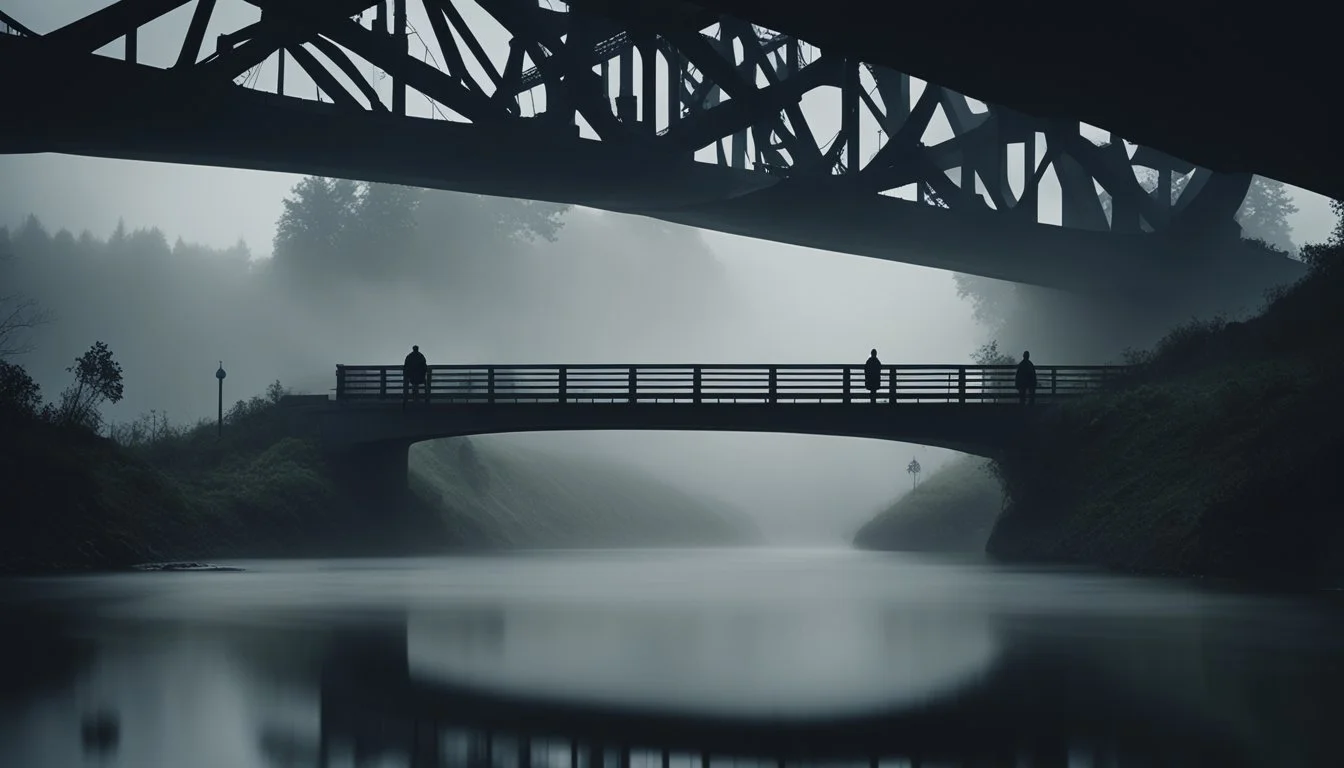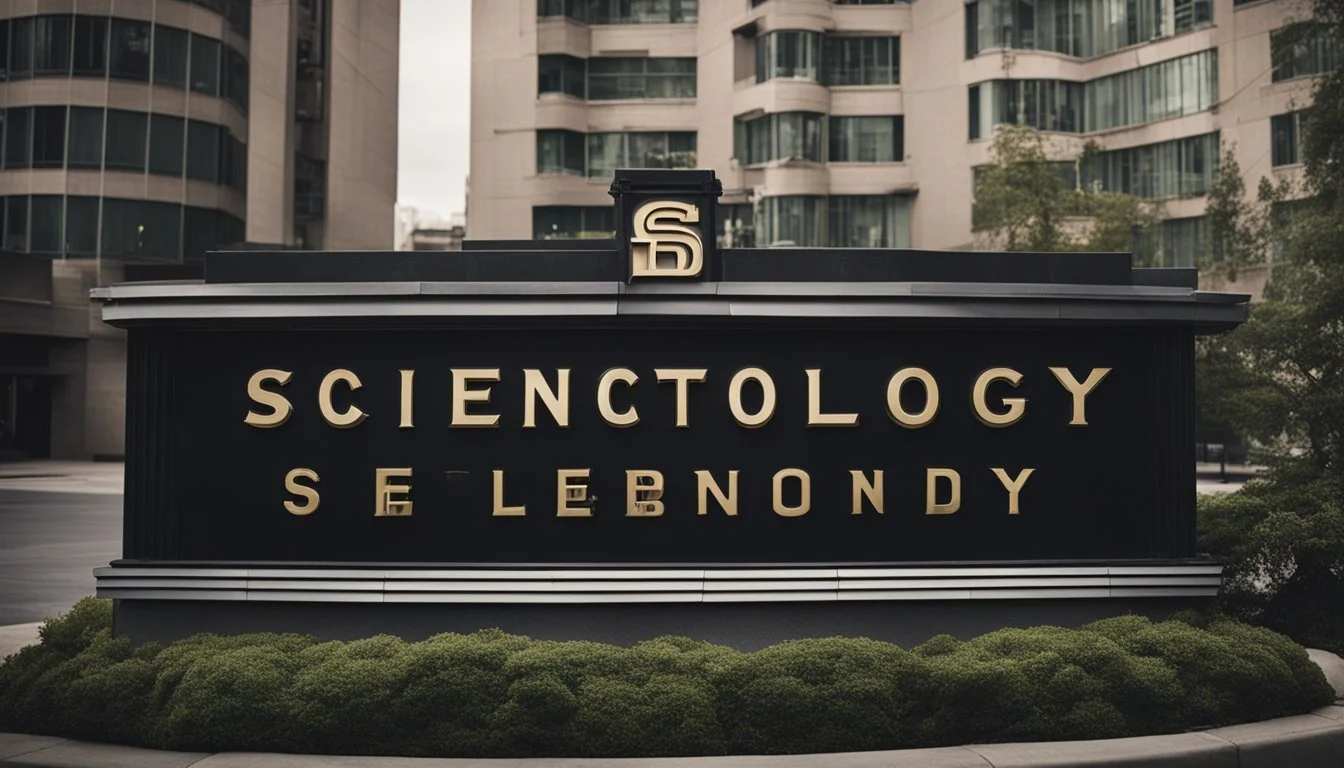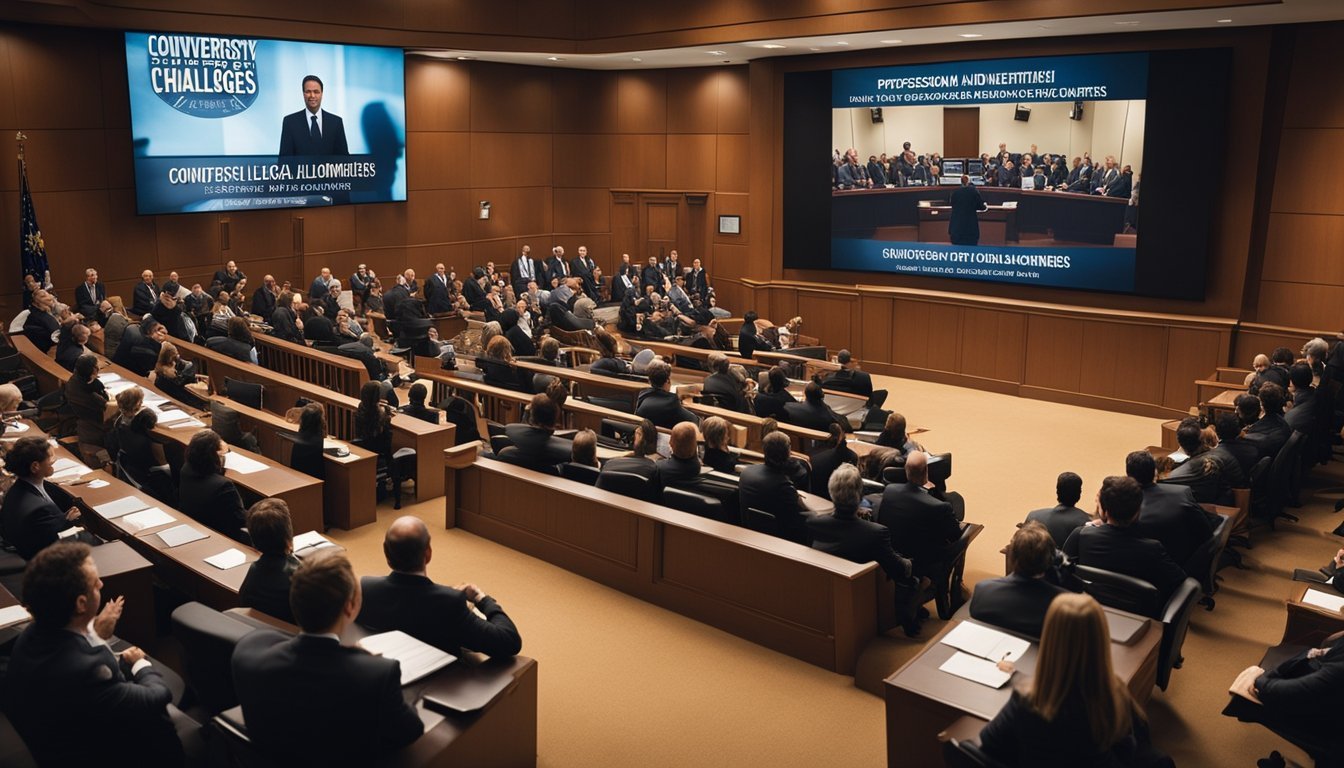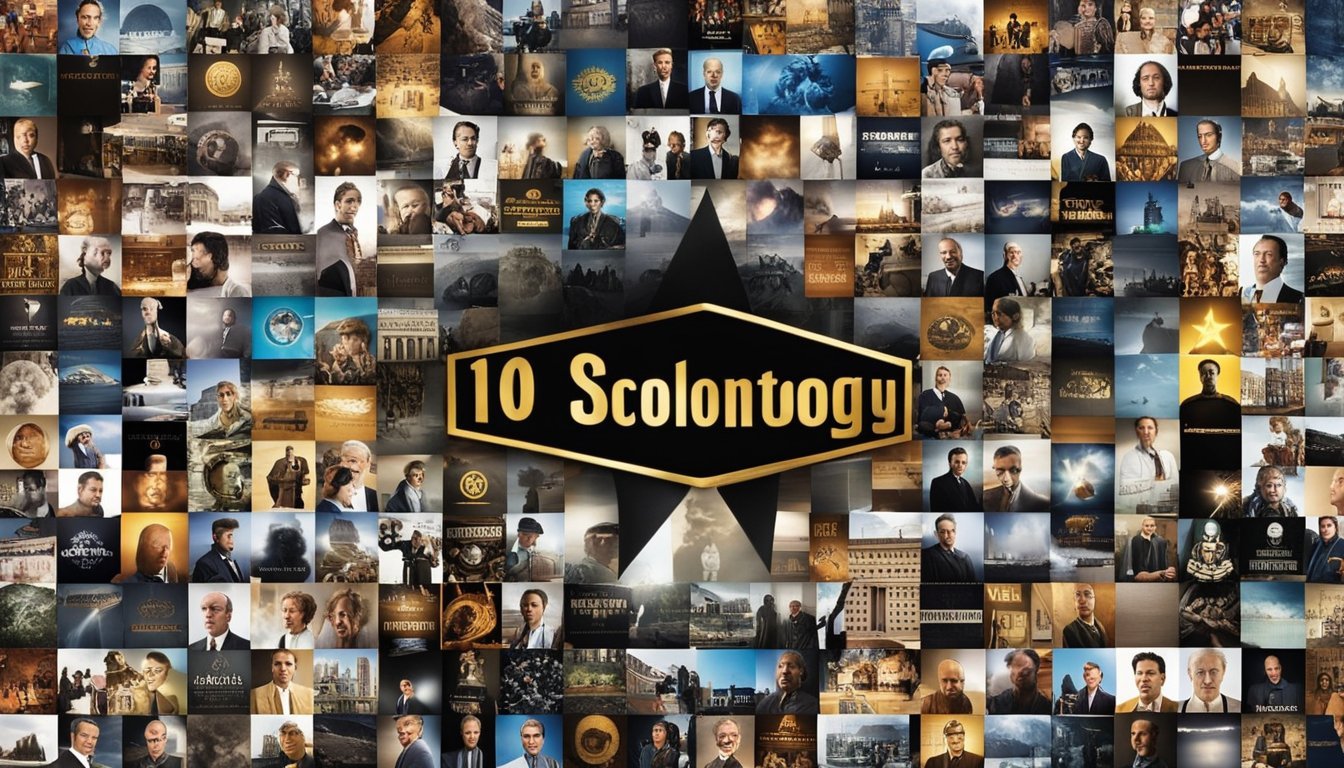10 True Crime Documentaries About Scientology
Shocking Stories Unveiled
Scientology has long been a subject of intrigue and controversy, gaining significant attention through various media portrayals and personal accounts. With its blend of secrecy and high-profile celebrity endorsements, the Church of Scientology has captivated and bewildered many. Among the most gripping depictions are true crime documentaries that explore the darker aspects of this religious organization.
These documentaries provide an in-depth look into allegations of criminal activities, manipulation, and cover-ups within Scientology, shining a light on stories that are often shrouded in mystery. For those interested in understanding the complex dynamics and controversial practices associated with the church, these films offer compelling insights and detailed narratives from insiders and experts alike.
1) Going Clear: Scientology and the Prison of Belief (2015)
"Going Clear: Scientology and the Prison of Belief" is a documentary directed by Academy Award winner Alex Gibney. Released in 2015, the film explores the intricate workings and controversies surrounding the Church of Scientology.
The documentary is based on the book "Going Clear" by Lawrence Wright and provides a detailed account of the church's history and practices.
Featuring interviews with former Scientologists, including high-profile individuals such as Paul Haggis and Spanky Taylor, the film sheds light on the methods the church uses to attract and retain members.
The documentary also delves into allegations of abuse and exploitation within the church, presenting a critical examination of its leadership and operations.
Audiences and critics alike have praised "Going Clear" for its thorough research and compelling storytelling. The film was nominated for seven Emmys, highlighting its impact and excellence in documentary filmmaking.
For more information, visit the IMDb page for "Going Clear: Scientology and the Prison of Belief."
2) Leah Remini: Scientology and the Aftermath (2016-2019)
Leah Remini: Scientology and the Aftermath is a documentary series that aired from 2016 to 2019. It explores the Church of Scientology through the personal experiences of Leah Remini and other former members.
The series is hosted by actress Leah Remini, who was a member of Scientology for over 30 years. She is joined by Mike Rinder and other former high-ranking members of the Church.
Each episode features emotional and often distressing stories from individuals who have left Scientology. These include accounts of alleged abuse, manipulation, and harassment.
Leah Remini provides a platform for these voices to be heard, shedding light on the practices and inner workings of the Church. Her efforts have been met with both support and controversy.
External Link: Leah Remini: Scientology and the Aftermath on IMDb
3) My Scientology Movie (2015)
"My Scientology Movie," directed by John Dower and starring Louis Theroux, offers an unconventional look at the Church of Scientology. Released in 2015, the documentary features Theroux's attempt to understand the inner workings of the church through reenactments.
Louis Theroux is known for his unique approach to documentary filmmaking, and "My Scientology Movie" is no exception.
The film uses young actors to audition for roles as high-profile Scientologists, recreating scenes based on accounts from ex-members. This creative method helps illustrate the experiences and testimonies in a vivid, sometimes unsettling manner.
Throughout the documentary, Theroux faces continual resistance from the Church. His interactions with Scientology officials and private investigators add a layer of tension and intrigue. The church’s aggressive tactics against critics become a central theme, providing insight into its controversial practices.
By offering an offbeat and revealing glimpse into the church, the film stands out among documentaries about Scientology. Theroux's characteristic wit and persistence keep viewers engaged while exposing lesser-known aspects of the organization.
For more information on "My Scientology Movie," visit Wikipedia or IMDB.
4) The Bridge (2015)
"The Bridge" is an influential documentary focusing on Scientology and its practices. Released in 2015, it explores the inner workings of the church, often referred to as a cult by critics.
The film delves into the methods used by Scientology to attract and retain members. It offers interviews with former members who describe their experiences in detail, shedding light on the organization's tactics.
Notably, "The Bridge" has faced significant opposition from the Church of Scientology, which has attempted to censor the documentary in various ways. This pushback underscores the controversial nature of the film's revelations.
Despite these challenges, the documentary remains a crucial resource for anyone seeking a deeper insight into Scientology. It provides a balanced view, using firsthand accounts and comprehensive research.
For more information on "The Bridge," visit its IMDB page.
5) Scientology: The Ex-Files (2012)
"Scientology: The Ex-Files" is a compelling documentary that offers a deep dive into the controversial world of Scientology. The documentary focuses on the experiences of Joe Reaiche, a former rugby star, who joined the Church of Scientology at the young age of 19.
Through the lens of Reaiche's story, the film explores the inner workings of the church and reveals the challenges faced by its members. The documentary covers a broad range of topics, from harsh disciplinary measures to financial exploitation.
Former elite members of Scientology emerge in the film to share their experiences, alleging extreme cruelty, forced labor, and financial greed within the organization. Their testimonies paint a disturbing picture of life inside Scientology.
The production team behind "Scientology: The Ex-Files" managed to navigate the organization's notorious secrecy and intimidation tactics to provide a rare glimpse into the church's operations.
For more information, visit IMDb.
6) The Path to Total Freedom
"The Path to Total Freedom" (2016) is a penetrating documentary that examines the inner workings and promises of the Church of Scientology. Directed by Charles Patterson, this film takes viewers through the various levels of the church's spiritual hierarchy.
The documentary includes interviews with former high-ranking members who provide firsthand accounts of their experiences within the organization. They discuss the intense indoctrination processes and the high monetary costs associated with reaching advanced spiritual levels.
It also investigates the church's marketing strategies, which often portray Scientology as a path to enhanced mental and spiritual health.
The filmmakers explore the contrast between these promises and the reality faced by many members.
Aside from interviews, the documentary uses archival footage and internal church documents to present a comprehensive overview of Scientology’s claimed benefits and actual practices.
For more information, you can visit the IMDb page here.
7) Frontline: The Secrets of Scientology (2010)
"Frontline: The Secrets of Scientology" aired in 2010 as part of the BBC's Panorama series.
Presented by John Sweeney, this investigative documentary follows his 2007 exploration of the Church of Scientology. It provides a deeper dive into the inner workings and controversies surrounding the organization.
The documentary includes interviews with former high-ranking members of the church. These individuals share personal accounts and accusations against the organization.
Sweeney’s approach emphasizes uncovering how the church allegedly manipulates and controls its followers. The film addresses claims of harassment and intimidation tactics used against critics and former members.
The documentary's strength lies in its firsthand testimonies and on-the-ground reporting. The information presented is supported by credible sources and offers a critical look at the church’s practices.
For further details, visit the Wikipedia page.
8) Wrapped in Lies: Inside Scientology
"Wrapped in Lies: Inside Scientology" (2015) delves into the intricate and concealed world of the Church of Scientology. This documentary provides a meticulous look at the organization's inner workings and the ongoing allegations against it.
Through interviews with former members and investigative journalists, viewers gain insight into the practices and culture of Scientology. The film addresses claims of manipulation, coercion, and abuse within the church.
The documentary highlights personal stories of individuals who escaped the church, shedding light on the challenges they faced and the repercussions of their exit. These firsthand accounts reveal the psychological impact of their involvement in Scientology.
Archival footage and secret recordings add a layer of authenticity to the testimonies, offering a rare glimpse into the guarded environment of the church. The filmmakers employ a methodical approach to ensure the accuracy of the presented information.
"Wrapped in Lies: Inside Scientology" stands as a significant exposé, contributing to the broader discourse on the controversial practices of the Church of Scientology.
For more information on "Wrapped in Lies: Inside Scientology" (2015), visit IMDb.
9) The Celebrity Trap
The intricate relationship between Scientology and Hollywood celebrities is explored in "The Celebrity Trap" (2017). This documentary dives into how the Church of Scientology strategically recruits and uses high-profile celebrities to bolster its public image.
Through various interviews, the film reveals that celebrities are given special treatment within the church. They receive exclusive facilities and personalized services, fostering a sense of importance and loyalty.
The documentary sheds light on the tactics used by the church to attract and maintain its celebrity followers. It includes accounts of how these strategies have been successful in drawing notable figures into Scientology.
Former members discuss the pressures and expectations placed on celebrity Scientologists. They also highlight the repercussions faced by those who speak out against the church.
"The Celebrity Trap" offers insights into the complex dynamics at play and the church's relentless efforts to expand its influence through fame.
More information about this film can be found here.
10) The Master: A Fictional Account (2012)
"The Master," directed by Paul Thomas Anderson, provides a fictional account inspired by certain aspects of Scientology. The film centers around Lancaster Dodd, a character closely resembling Scientology's founder, L. Ron Hubbard.
Portrayals highlight the charismatic and controlling nature of Dodd, played by Philip Seymour Hoffman.
The story follows Freddie Quell, a troubled drifter, who becomes enamored with Dodd's cult-like group. Through Quell's journey, viewers witness the psychological impact of indoctrination and manipulation.
Though not a direct documentary on Scientology, the film draws heavy parallels with the religion. It captures the allure and subsequent disillusionment experienced by followers.
Anderson's meticulous direction provides a dramatic and thought-provoking exploration. The film’s intensity is elevated by outstanding performances from Hoffman, Joaquin Phoenix, and Amy Adams.
The visual storytelling and character development offer a window into how cult-like entities operate. This makes "The Master" relevant to discussions about Scientology and similar groups.
For viewers interested in fictional narratives with real-world implications, "The Master" offers an intriguing look. Its artistic approach blends compelling storytelling with critical themes.
More information about the film can be found on its Wikipedia page.
The Origins of Scientology
Scientology traces its roots to the 1950s when L. Ron Hubbard's ideas about the mind and spirit began to take shape. These beliefs were formalized with the founding of the Church of Scientology.
L. Ron Hubbard's Vision
Lafayette Ronald Hubbard, commonly known as L. Ron Hubbard, was an American author and the main driving force behind Scientology. He started his journey with the publication of "Dianetics: The Modern Science of Mental Health" in 1950. This book detailed his theories on the human mind and introduced the idea of the "reactive mind," a part of the mind that stores painful experiences.
Hubbard's concepts promised personal improvement through auditing, a process he claimed could clear individuals of negative mental images and improve their overall well-being. Key to his vision was the belief that humans are spiritual beings, known as thetans. These thetans are thought to be immortal and possess unlimited potential that has been stifled by past traumas. His ideas quickly garnered a following and laid the foundation for what would become Scientology.
Founding of the Church
The Church of Scientology was formally established in December 1953 in Camden, New Jersey. Hubbard, along with a handful of followers, incorporated the first Church of Scientology as a means to disseminate his teachings. This move allowed the organization to structure itself more formally and gain a foothold in the religious community.
Initially, the church's focus was on practicing and teaching auditing techniques. It soon expanded its reach by establishing missions across the United States and later, internationally. By centralizing its headquarters and creating a formal hierarchy, the Church gained greater control over its doctrine and membership.
Scientology's quest for religious recognition also began during these early years, marked by legal and ideological battles, including contentious efforts to obtain tax-exempt status. These foundational steps set the stage for the Church's growth and its eventual global presence.
Controversies and Legal Challenges
The Church of Scientology has been at the center of numerous legal battles and personal allegations from ex-members. These controversies provide a deep insight into the organization's complex and often secretive operations.
Infamous Court Cases
Scientology's legal history is marked by several high-profile court cases.
One notable case involved the IRS, where Scientology fought for years to obtain tax-exempt status. In 1993, a controversial settlement granted the organization this status, despite significant public skepticism.
Another key case was the conviction of several high-ranking Scientologists in the 1970s for illegal activities, including Operation Snow White. This covert operation aimed to purge unfavorable government records about Scientology and led to significant jail sentences.
These court cases illustrate the organization's aggressive legal strategy and its ongoing battle against public and governmental scrutiny.
Ex-Members' Allegations
Ex-members have frequently accused Scientology of various unethical and abusive practices. These allegations are documented in numerous interviews and documentaries.
Ex-members often claim psychological abuse and financial exploitation. Some describe being pressured into expensive courses and treatments.
Leah Remini, an actress and former Scientologist, has been outspoken about the alleged mistreatment within the church. She highlights issues like forced disconnection from family members and intense control over personal lives.
These personal accounts from ex-members paint a troubling picture of life inside Scientology, raising serious ethical and moral concerns.
Impact on Pop Culture
Scientology documentaries have significantly influenced public perception and conversation. These films not only expose the church’s secretive practices but also examine the broader implications of its presence in mainstream media.
Media Coverage
True crime documentaries about Scientology have garnered extensive media attention, with many networks and streaming platforms airing investigative exposés. Notable documentaries like Going Clear: Scientology and the Prison of Belief and The Secrets of Scientology have been critically acclaimed for their in-depth research and shocking revelations.
High-profile documentaries have often won prestigious awards, boosting their visibility and spreading awareness about the controversial practices within the church. This, in turn, has fueled ongoing media scrutiny and public discussion.
Influence on other media: The growing number of these films has inspired fictional portrayals in television shows and movies, further embedding the topic of Scientology into pop culture. This cross-media presence reinforces the subject's relevance and keeps the conversation alive.










